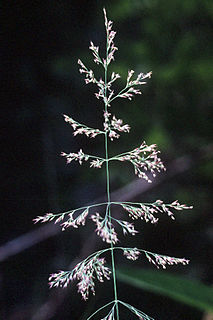
Calamagrostis is a genus of flowering plants in the grass family Poaceae, with about 260 species that occur mainly in temperate regions of the globe. Towards equatorial latitudes, species of Calamagrostis generally occur at higher elevations. These tufted perennials usually have hairless narrow leaves. The ligules are usually blunt. The inflorescence forms a panicle. Some may be reed-like.

Ornamental grasses are grasses grown as ornamental plants. Ornamental grasses are popular in many colder hardiness zones for their resilience to cold temperatures and aesthetic value throughout fall and winter seasons.
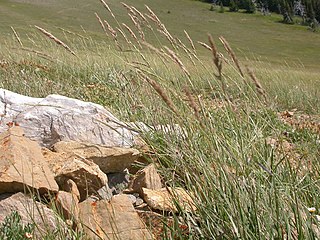
Calamagrostis purpurascens, is a perennial grass commonly known as purple reedgrass, purple pinegrass, or alpine reedgrass. It grows 30 to 80 centimetres (31 in) tall.
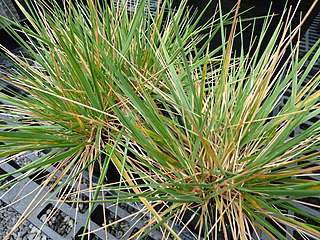
Calamagrostis expansa is a species of grass in the family Poaceae known by the common name Maui reedgrass. It is native to Hawaii, where it is known only from Maui and the island of Hawaiʻi. Its natural habitats are lowland moist forests and swamps. It is threatened by habitat loss.

Calamagrostis hillebrandii is a species of grass in the family Poaceae known commonly as Hillebrand's reedgrass. It is endemic to Maui in Hawaii, where there are only two known subpopulations with a total of perhaps 500 individuals. This is a federally listed endangered species of the United States.
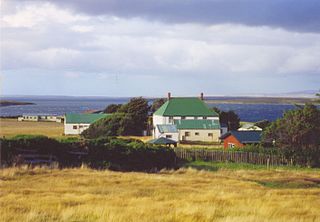
Tussock grasses or bunch grasses are a group of grass species in the family Poaceae. They usually grow as singular plants in clumps, tufts, hummocks, or bunches, rather than forming a sod or lawn, in meadows, grasslands, and prairies. As perennial plants, most species live more than one season. Tussock grasses are often found as forage in pastures and ornamental grasses in gardens.

Calamagrostis canadensis is a species of grass, having three or more varieties, in the family Poaceae. It is known variously by the common names of bluejoint, bluejoint reedgrass, marsh reedgrass, Canadian reedgrass, meadow pinegrass, and marsh pinegrass.

Calamagrostis bolanderi is a species of grass known by the common name Bolander's reedgrass. It is endemic to northern California, where it grows in moist coastal habitat such as temperate coniferous forest, wet meadows and bogs, and coastal scrub.
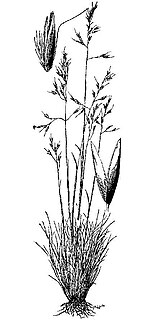
Calamagrostis breweri is a species of grass known by the common name shorthair reedgrass.

Calamagrostis foliosa is a species of grass known by the common name leafy reedgrass. It is endemic to northern California, where it grows in the forests and scrub on the coastline.

Calamagrostis koelerioides, the fire reedgrass, is a species of grass native to western North America in the United States. It ranges from western Wyoming to Washington state, south to Mexico. It is found in many habitat types.

Calamagrostis ophitidis, the serpentine reedgrass, is a species of bunch grass in the family Poaceae.
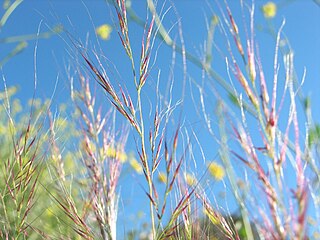
Vulpia microstachys is a species of grass known by the common names small fescue and small sixweeks grass. It is native to western North America from British Columbia to Colorado and New Mexico to Baja California, where it grows in many types of open habitat, including grasslands. It is dominant on some grasslands of California, and it was probably an abundant native grass before the habitat was altered by invasive non-native grasses. It occurs on serpentine soils with associates such as serpentine reedgrass. It is also known from parts of South America. It is an annual grass producing one stem or a clump of several stems growing up to 75 centimeters tall. The inflorescence has several open branches bearing clusters of purple-tinged spikelets. The spikelet has one to six flowers. The grass is usually cleistogamous, its flowers fertilizing themselves.

Calamagrostis montanensis is a species of grass known by the common names plains reedgrass and prairie reedgrass. It is native to North America, where it is found across Canada from British Columbia to Manitoba and south to Colorado in the United States.
Leymus innovatus is a species of grass known as downy ryegrass, boreal wildrye, hairy wildrye, fuzzyspike wildrye, northern wildrye, and northwestern wildrye. It is native to northern North America from Alaska to eastern Canada and south to Colorado.
Calamagrostis lapponica, the Lappland reedgrass, is a grass species native to colder parts of the Northern Hemisphere. It has been reported from Scandinavia, Russia, Greenland, Alaska, and every Canadian province and territory except the Maritime Provinces.

Calamagrostis tweedyi, the Cascade reedgrass or Tweedy's reedgrass, is a perennial in the grass family. It is native to the Pacific Northwest in the United States, in Washington, Oregon, Idaho, and Montana.














